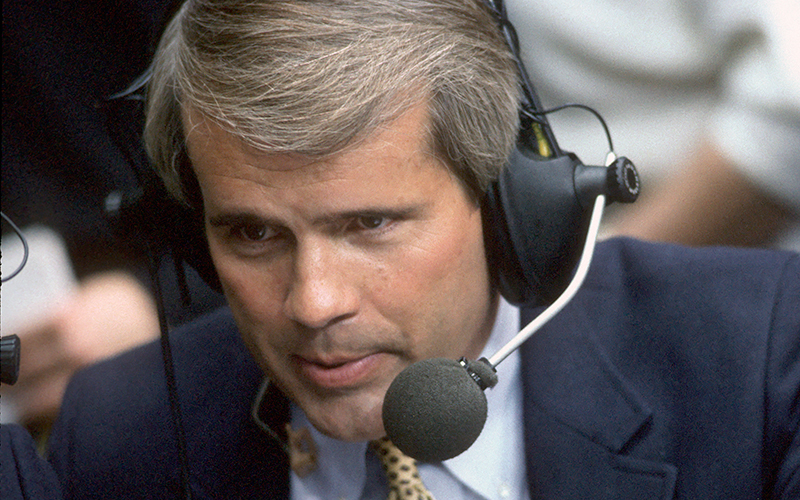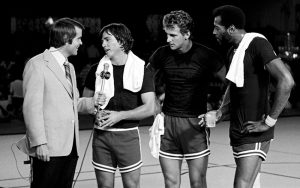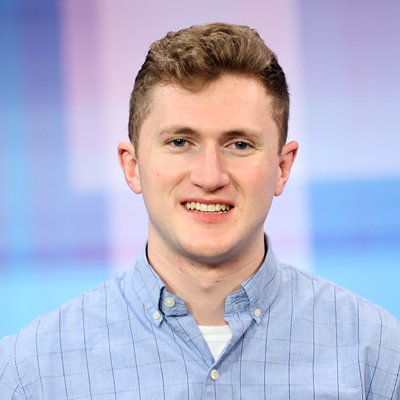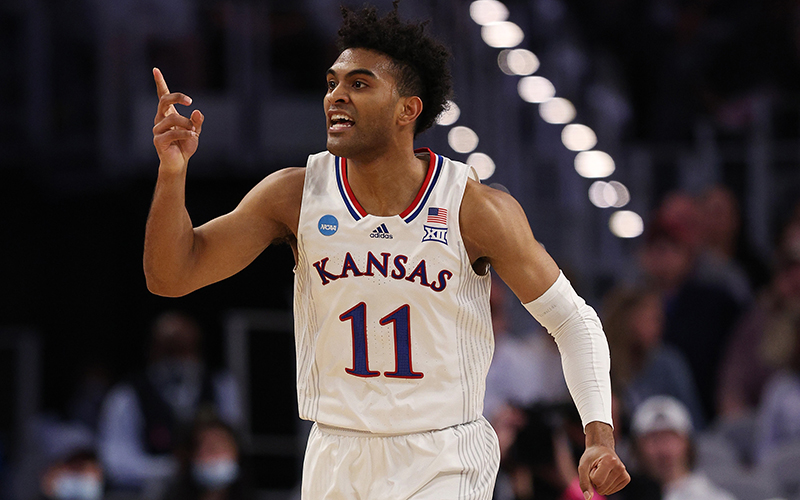
Many in metro Phoenix know Gary Bender as the voice of the Suns. But he also had a front row seat to two of the most memorable NCAA Tournament games. (Photo by George Gojkovich/Getty Images)
PHOENIX – On Saturday, Duke, Villanova, Kansas and North Carolina square off in New Orleans for the right to be crowned national champions of Division I men’s college basketball.
Forty years earlier in the same city, the North Carolina Tar Heels and Georgetown Hoyas played in one of the most memorable games in NCAA Tournament history, capped by Michael Jordan’s game-winning shot for the Tar Heels.
The next year, North Carolina State was the last team standing in 1983’s iteration of March Madness, in which the Wolfpack won four of the six games by a single possession.
Gary Bender, who lived in Phoenix off and on for more than four decades,called all Final Four games from 1982 to 1984. He broadcasted 27 sports, including the NBA Phoenix Suns for 18 seasons.

During a 1978 celebrity basketball event, Gary Bender interviewed actor Richard Hatch, former coach Paul Westphal and former NBA player Gus Johnson. (Photo by Martin Mills/Getty Images)
Regardless of the sport he called, Bender was up to the task.
“Gary was the most prepared broadcaster I’ve worked with in my career,” executive producer for Phoenix Suns Television Bob Adlhoch said in an email.
In 1982, Bender was on the call as Tar Heels coach Dean Smith captured his first NCAA title. Standing at the center of the Lousiana Superdome before the game, Bender took in the domed stadium that held over 60,000 for a Final Four game.
“I remember it was the first really huge arena that we had really been involved in,” Bender said. “I remember standing at center court before the start of our broadcast and looking up in the stands and saying to Billy (Packer), ‘I don’t think anybody sitting up there in that upper level could even see the basketball.’”
With a national championship that featured Sam Perkins, James Worthy, Patrick Ewing and Michael Jordan, Bender was the voice behind it all. He, like most people, was surprised who took the last shot for the Tar Heels.
“The thing that was so significant to me was the guy that took the shot for North Carolina, was a freshman, Michael Jordan … (when Smith) came out of their timeout. I remember Billy and I were thinking, ‘Well, they’ll probably set up a play for Worthy,’” Bender said.
Jordan took the shot and led the Tar Heels to their second national championship, a 63-62 victory over the Hoyas.
A basketball player now commonly referred to as the greatest to ever do it, Jordan’s shot acted as his arrival into greatness. America witnessed this shot through the perspective of Bender.
The shot that won it all ?
4️⃣0️⃣ years ago today, freshman Michael Jordan hit a game-winner to win the #NationalChampionship for @UNC_Basketball ?
Forever iconic. #MarchMadness pic.twitter.com/lc3vUzM7KG
— NCAA March Madness (@MarchMadnessMBB) March 29, 2022
“It ended up being the first real, I guess, exposure of Michael Jordan,” Bender said. “We knew he was good. But we didn’t know how good he was.”
In 1983, Bender called the national title again, this time witnessing Jim Valvano and his Cinderella North Carolina State Wolfpack team upset Houston, also known as Phi Slama Jama, 54-52.
Houston was coming into the game riding a 26-game winning streak and featured such future NBA stars as forward Clyde Drexler and center Hakeem Olajuwon. The Cougars were 7-point favorites against the Wolfpack and were averaging just over 78 points in the NCAA Tournament up to the title game. They scored 26 fewer against N.C. State.
“We were concerned that we could have a blowout,” Bender said. “The talk in our production meetings before the game was ‘let’s be prepared. If this game goes south, we need to develop some things that we can do visually and so forth.’”
The Wolfpack got off to a fast start and led at halftime before a 17-2 Houston run put the Cougars in the driver’s seat despite Drexler picking up four fouls in the first half. To slow the game down, Valvano relied on a familiar strategy he had used all season long.
“What happened was because of Olajuwon having issues with high altitude and (Drexler’s) foul trouble, Guy Lewis, the coach of Houston, elected to slow the game down,” Bender said. “Jim Valvano, the coach at North Carolina State, started fouling them, and (Houston) couldn’t hit free throws.”
With 44 seconds left in the game, N.C. State elected to dribble out the time for the last shot. (There was no shot clock in college hoops at the time.)
After nearly turning the ball over twice, N.C. State guard Dereck Whittenburg launched a 30-footer that would’ve resulted in an air ball, only for Wolfpack forward Lorenzo Charles to grab the ball out of the air and alley-oop it for the game-winning, buzzer-beating basket.
? April 4, 1983: On this date 37 years ago…
National Title ?
#6 NC State vs. #1 Houston (-7)Tied at 52…
?️ "It's down to 7 sec, you can see the time…
Whittenburg .. oh that's a long ways…
It's there! OHHH! They won it!"Lorenzo. Charles. ✅: https://t.co/LwC8BEGA3I
— Action Network (@ActionNetworkHQ) April 4, 2020
“It was called ‘the shot heard around the world,’” Bender said.
These two back-to-back title games are viewed as some of the best in NCAA Tournament history, with Bender guiding viewers through the broadcast on both occasions. At 42, Bender’s mark on sportscasting was undeniable, but his career was far from over.
After stints at ABC and Turner Sports, Bender found himself as the voice of the Phoenix Suns, the place where he would finish out his broadcasting career.
“Gary was already a legend in sports broadcasting by the time he started calling Suns games back in the early ’90s,” Adlhoch said. “As a young producer, it was honestly a little intimidating to be working with someone who I’d grown up watching and one who had so much more experience than I.”
Bender left his mark on the Valley for 18 seasons until his retirement in 2011.
“We loved Gary,” Adlhoch said. “I loved Gary. He was such a professional and brought his calming voice to every broadcast. He narrated the soundtrack of the first 10 years of my NBA career. You couldn’t find a crew member that ever worked a Suns broadcast that didn’t love working with Gary Bender.”
“Gary was a great announcer, a good friend and a mentor to whom I owe a great debt of gratitude,” Adlhoch added. “I miss working with him. He’s also a rare announcer who opted to retire while he still had a lot on his fastball. More often, announcers begin to make glaring mistakes and are rarely aware that they’ve overstayed their prime years. Gary was the rare one that retired while still on top of his game.”
Every year, as the calendar turns from March to April, clips from the 1982 and 1983 national championship games will resurface, with Bender as the man behind the calls. He said his most fond memory of those Final Fours involves the beginning of his relationship with Michael Jordan.
“When I later was doing the NBA, we had this kind of routine,” Bender said. “Before the start of the game, I’d be standing nearby getting ready to either do the game or just watching. He’d come over and we’d, you know, high-five each other and talk and visit. It was a treat for me that he remembered I called the game when he hit the shot.”

